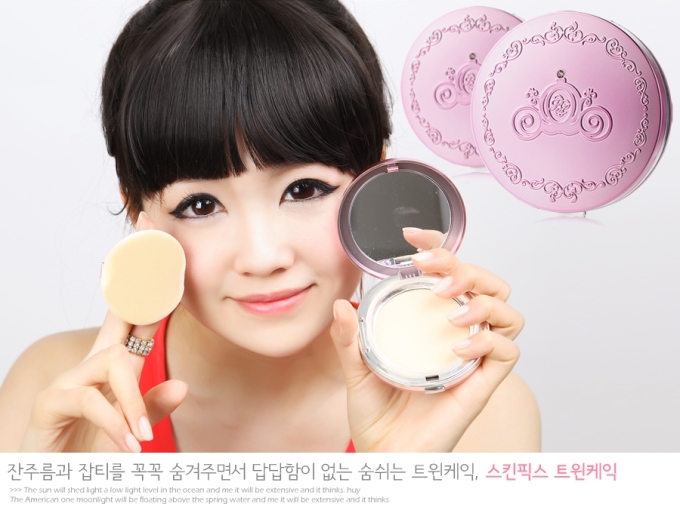 (Source)
(Source)
It’s such a struggle being a feminist parent.
I have two daughters: Alice, born in June 2006, and Elizabeth, born in August 2008. Fortunately, Elizabeth at least is just fine in the girl-power department, and is “second-sex” to no-one. Rather, it’s my own sex-life that comes a far-distant second to catering to her demands 24/7, but let’s not go there.
Alice however, will regularly stroll down the toy aisle at the supermarket, and loudly proclaim that she doesn’t like the black and blue cars and trucks on one side because “they’re for boys”, to which I’ll have to gently remind her—yet again—that she actually has many she regularly plays with at home. She’s also started constantly posing and asking if she’s pretty, and it’s honestly starting to feel tiresome, almost pedantic to always reply “Yes, and strong and smart too!”.
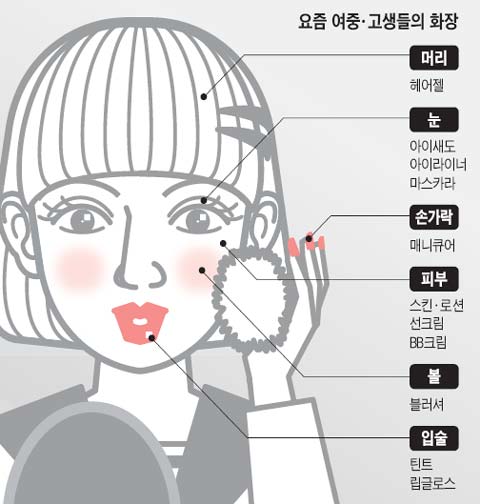 This literally came to a head yesterday morning when she used those smarts to look for the clip-on earrings that her well-meaning but misguided kindergarten had given her for Children’s Day, eventually devising an elaborate system of stools and chairs to climb to the top of the chest of drawers and see if we’d hidden them there. Very proud of herself for finding them, she jumped on my face at 6:00am to wake me up and show them off (source, right).
This literally came to a head yesterday morning when she used those smarts to look for the clip-on earrings that her well-meaning but misguided kindergarten had given her for Children’s Day, eventually devising an elaborate system of stools and chairs to climb to the top of the chest of drawers and see if we’d hidden them there. Very proud of herself for finding them, she jumped on my face at 6:00am to wake me up and show them off (source, right).
I didn’t scold her though (at least not for the earrings), as nothing could faze me after seeing what had been done to the poor girls that grace Sonyunara.com (소녀나라; “Maiden Country”), which I’d found the night before while researching this post. Seriously, just take a look for yourself.
But in just a few years, will Alice and then Elizabeth also be among the alleged wave of middle and even elementary school students spending 30 minutes a day applying makeup? Hell no. But will they want to? Probably. Is that a bad thing? That depends. And why are so many students doing it now in particular?
All questions to bear in mind as you read the following story from The Chosunilbo below.^^ Found via Asian Correspondent, it was the second most read “society story” on Naver last week:
[오늘의 세상] 초등생까지 화장 열풍… 학교, 두 손 들었다
[Today’s World] Even Elementary Schools Raise Hands in Surrender at Wave of Students Using Make-up…
• 지나친 ‘얼짱 신드롬’… ‘걸그룹’들이 큰 영향 줘… 등교시간에도 30분씩 화장 / Excessive “Best-Face Syndrome”…Girl groups’ big influence…Even at school, spending 30 minutes at a time applying cosmetics
• 학칙 있으나마나… 화장하는 아이들 워낙 많아… 쉬는 시간 화장실은 파우더룸 / Whether or not there’s school regulations…Children are putting far too much on…In break times, the toilets become powder rooms
• 식약청의 경고… “어린이들은 피부 약해 트러블 생길 위험 크다”/ The Korean FDA warns…”Children’s skin is weak, and there is a big danger of problems developing”
• “그 틴트(입술에 색을 내는 화장품의 일종) 나도 발라 볼래” / “Let me put on that tint too (tint: a kind of cosmetic that gives color to lips)”
“와~오렌지색 되게 예쁘다” / “Wow~the orange is really pretty”
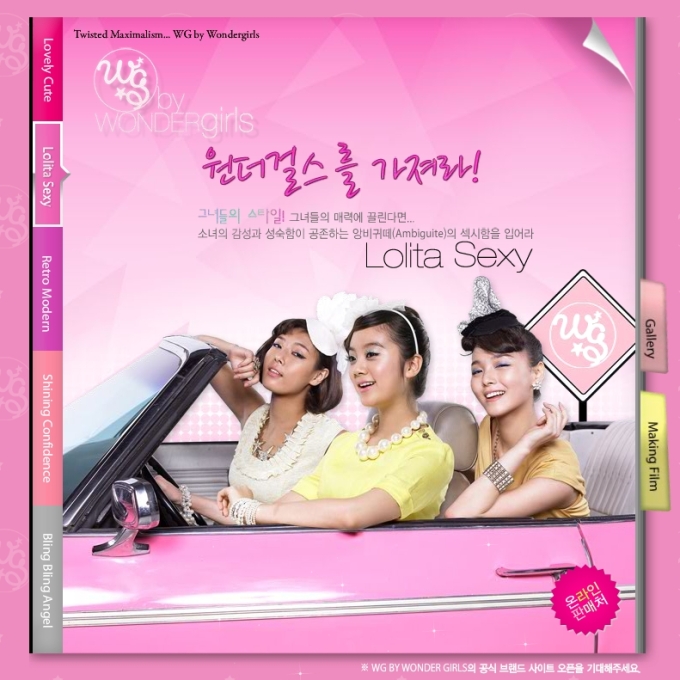 (Source. Discussed here)
(Source. Discussed here)
경 남지역 여자 중학교에 근무하는 국어교사 김모(34)씨는 며칠 전 교실에 들어서자마자 한숨이 나왔다. 학생들이 각자 화장품 파우치(작은 가방)를 꺼내놓고 ‘신제품 품평회’를 벌이고 있었다. 한 학생의 파우치 속엔 파우더, BB크림, 틴트, 아이라이너, 마스카라, 매니큐어 등이 가득 들어 있었다.
A few days ago, Kim Mo, a 34 year-old Korean teacher at a middle school in Gyeongsang Nam-do, walked into a classroom and saw something that took her breath away. In the classroom, there were children with a makeup pouch each (a small bag) and had taken everything out of them to have a “new makeup show”. In one student’s case, her pouch had been full of such things as powder, BB Cream, tint, eyeliner, mascara, and a manicure set.
화장한 학생들 얼굴도 제각각이었다. 어떤 학생은 파우더를 발라 얼굴이 뽀얗고, 어떤 학생은 액(液)을 발라 쌍꺼풀을 만들고 아이라인까지 그렸다. 틴트를 발라 입술이 빨간 학생들도 여러 명이었다.
Of the students who had put the makeup on, their faces were all different. Some had used powder to make their faces milky-white, while some had used a liquid to give themselves double-eyelids, even going so far as to use eyeliner. Several had also applied tint to their mouths and now had red lips.
쉬는 시간이면 이 학교 화장실은 ‘파우더룸’으로 변한다. 10여명의 학생들이 거울 앞에서 머리를 만지거나 화장을 한다. 서로 눈썹이나 아이라인을 그려주는 것도 흔한 모습이다.
If it’s break time, the toilets change into powder-rooms. Around 10 students will gather in front of the mirror and fix their hair or apply cosmetics. Drawing eyebrows on each other with eyeliner is a common scene.
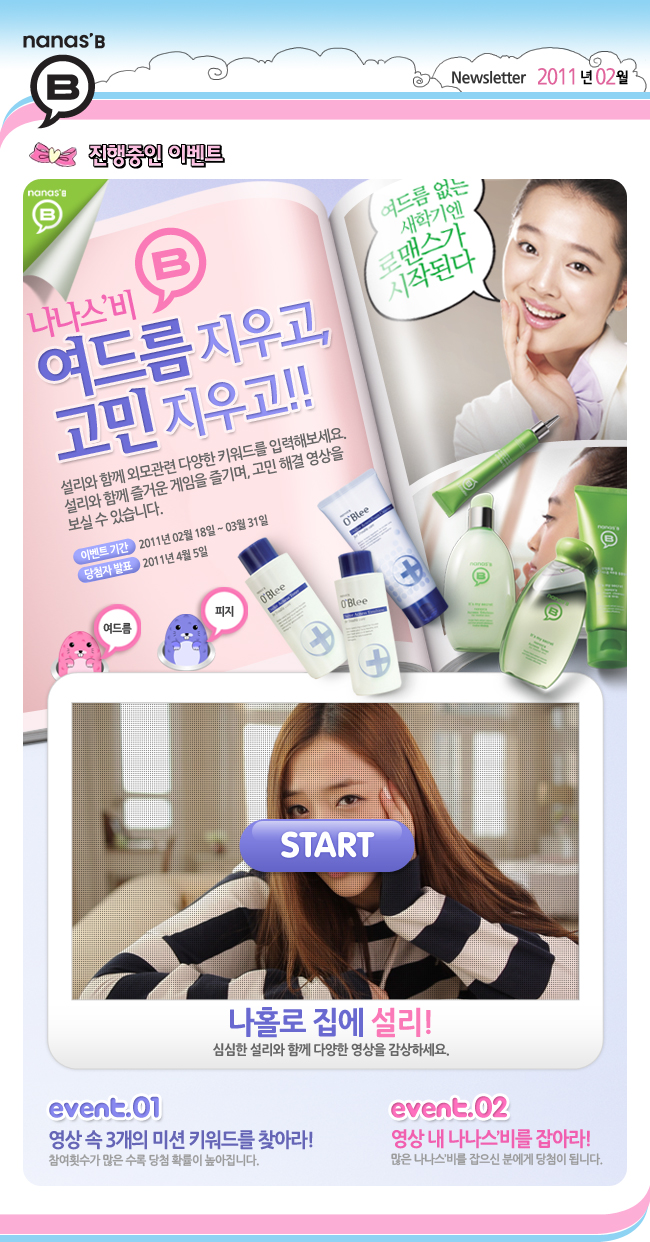 (Source)
(Source)
김 교사도 처음엔 화장이 학칙에 위배되기 때문에 화장한 학생들이 눈에 띌 때마다 “화장을 하지 마라”고 했다. 클렌징폼을 건네주며 “당장 세수하고 오라”고 하기도 했다. 소지품을 검사해 화장품을 압수하기도 여러 번. 그래도 나아질 기미가 보이지 않자 요즘엔 “어린 나이에 화장하면 피부에 안 좋다”며 달래고 설득한다.
At first, Kim would tell students using cosmetics that they were against school rules, that they shouldn’t use them, and would immediately give them cleansing foam to clean the cosmetics off. She also checked to see if students had any cosmetics and would confiscate them if they did. As there was no sign of improvement however, then these days instead she tries to persuade them that “if you put on cosmetics when you’re young, then your skin won’t be good”.
김 교사는 “화장하는 애들이 워낙 많아 쫓아다니면서 일일이 지적하기도 힘들 정도”라며 “전쟁도 이런 전쟁이 없다”고 말했다.
Kim says “Chasing after students that use too much cosmetics while pointing out everything [that’s bad about using cosmetics?] to them is so exhausting”, and that “it’s such a battle”.
학생들은 백화점 화장품 코너에서도 주요 고객으로 떠올랐고, 화장품 회사들은 인기 캐릭터를 그린 상품을 쏟아내고 있다.
Students have risen to become the main customers at cosmetics corners at department stores, and cosmetics companies are having popular [manhwa?] characters on their products.
◆화장 붐에 두 손 든 교사들 / Teachers Raise Their Hands in Despair at Cosmetics Boom
교사들은 “화장하는 학생이 한 반에 몇 명이라고 세기 힘들 정도”라고 말한다.
Teachers say “there’s so many students using makeup in each class, it’s difficult to count them all”.
서울의 한 중학교 1학년 담임교사는 “학생들끼리 마스카라나 아이라이너를 생일 선물로 주고받을 정도로 화장에 대한 관심이 많다”며 “초등학생 때부터 화장을 시작해 피부가 어른처럼 엉망인 애들이 갈수록 많아진다”고 말했다.
One homeroom teacher for a first-grade middle-school class [for students roughly 13-14 years old] said “Students are interested enough in mascara and eyeliner to give them to each other for birthday presents”, and that “There are many students that, starting to wear makeup in elementary school, are ruining their skin like adults”.
학 부모들은 걱정이다. 중학교 2학년 자녀를 둔 김순옥씨는 작년부터 딸아이가 각종 화장품을 사 모으는 것을 보고 깜짝 놀랐다. 김씨의 딸은 바쁜 등교시간에도 30분씩 스킨·로션 등 기초 화장품부터 BB크림, 파우더까지 정성껏 바른다. 김씨가 야단을 치며 화장을 못하게 했더니 딸은 “화장을 안 하면 부끄러워서 학교에 못 가겠다”고 반항했다. 김씨는 “딸아이가 사춘기여서 그러려니 했지만 공부에 대한 집중력이 떨어지는 것 같아서 걱정”이라고 말했다.
Parents of students are worried. Kim Soon-ok, a mother of a 2nd grade middle school student [14 or 15 years old], has been very surprised at how her daughter has been buying and collecting all kinds of makeup since last year. Despite being busy, every school day she spends 30 minutes at a time applying everything from toner, lotion, and other basic cosmetics to BB cream and powder. Kim says that she scolded her daughter to make her stop using it, but her daughter resisted and replied that “If I don’t wear makeup, I’ll be embarrassed and won’t be able to go to school”. She added that “although this sort of thing is natural for a girl entering puberty, I worry that her ability to concentrate on her studies is decreasing”.
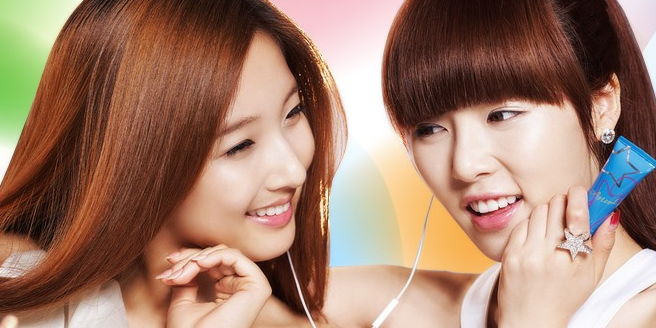 (Source)
(Source)
이처럼 학생들의 화장 문제가 심각해지자 얼마 전 식약청은 교육청과 학교에 색조 화장품 등의 사용을 자제하게 해달라는 요청문을 보내기도 했다. 식약청 화장품정책과 양준호 사무관은 “어린이들은 어른보다 피부가 약해 립스틱이나 매니큐어 등 색조 화장품을 사용하면 피부 트러블이 생길 수 있어 조심해야 한다”고 말했다.
Accordingly, the FDA sent schools and the Ministry of Education a letter requesting that they restrict student’s use of color make-up, and so on. Yang Jun-ho, and official within in the FDA’s Cosmetics Policy Department, said “Children’s skin is weaker than that of adults, and so if they use lipstick, manicures, or color makeup they have a [greater?] chance of skin problems developing, and should be careful”.
◆과도한 ‘얼짱 신드롬’ / Excessive “Best-Face Syndrome”
성적이 상위권이거나 모범적인 아이들이 화장하는 경우도 늘고 있다. 이처럼 학생들 사이에 화장이 널리 유행하는 현상에 대해 전문가들은 ‘얼짱 신드롬’과 10대 멤버들이 많은 ‘걸그룹’이 큰 영향을 미치고 있다고 분석한다. 건국대 이동혁 사범대 교수는 “요즘 10대들은 과거 세대보다 자신을 잘 포장해서 당당하게 드러내려고 하는 성향이 강하다”며 “그런 학생들의 특성이 외모를 중시하는 사회적 분위기와 어우러져 나타나는 현상 같다”고 말했다. 한국청소년활동진흥원 김용대 부장은 “예뻐지고 싶어하는 것은 사춘기 여학생들의 자연스러운 특징이지만 화장을 통해 자기만족을 추구하려는 청소년의 집단적 현상은 심각한 문제가 아닐 수 없다”고 말했다.
Even model students with high grades and rankings are increasingly using makeup. An expert on this phenomenon attributes this “beauty-face syndrome” to the influence of girl groups with members in their teens. Professor Lee Dong-hyuk of the Education Department of Konkuk University says “compared to past generations, these days social trends mean that teenagers attach a lot of importance to their appearance and want to show them off.” And Kim Young-dae, head of the Korea Youth Work Agency, says “it is a natural trait of female students entering adolescence to want to look pretty, but this mass of girls trying to find satisfaction and fulfillment through make up is a serious problem”.
Writer: 김연주 / Kim Yeon-ju – carol@chosun.com
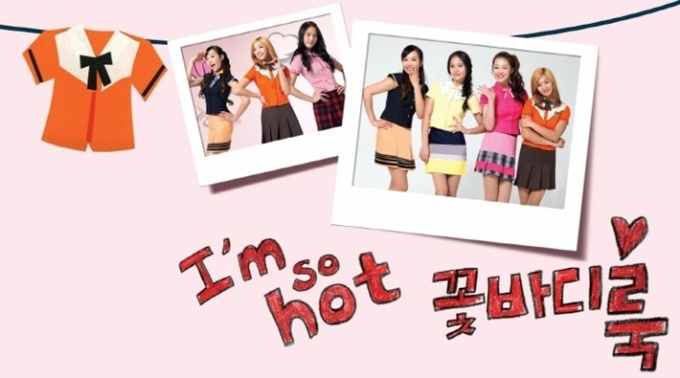 (Source)
(Source)
While the headline clearly exaggerates a little by mentioning elementary school students, only then to talk about middle school ones, that’s probably one of the better articles I’ve read in the notoriously tabloid Korean media (update: apparently that same tabloid media has considerably lowered my standards!^^). Is the popularity of makeup among students as recent as the article suggests though? Let’s discuss that in a moment. First, let’s see what Meenakshi Durham has to say about cosmetics in The Lolita Effect itself, the book that inspired this ongoing series (p. 126):
Studies have suggested that little girls enjoy emulating fashion trends, using makeup, and attracting boy’s attention by wearing skimpy clothes. In social settings where girls are not going to be penalized or targeted for these behaviors, it’s easy to see how these things could be completely harmless, fun, or even empowering. Clothing and makeup aren’t problematic.
While I wasn’t joking earlier about what I saw on Sonyunara, reading that the night before was the real reason I didn’t (visibly) react negatively to seeing my daughter wearing earrings: children are always going to emulate what they see adults and/or other role models doing. Rather, it’s how we adults react to that that is the problem:
It’s the corollary assumption—that youth is sexy, that little girls are sexy, and that because of that they can be seen as having the same sexual awareness as adults—that’s of real concern. The problem is not with children, but with adults: with marketers who knowingly sell products and images with powerful sexual overtones to young girls, and with adults who then interpret girls’ bodies as sexually available. And there’s a larger, social problem, too, in that because of the increased sexualization of girlhood, children are engaging in sexual activity at younger and younger ages. This has fallout that is expensive both to the kids and to society as a whole.
 (Source)
(Source)
At first, that probably sounds much more relevant to the US and other Western countries than it does to “sexually conservative” Korea. But you may be surprised. Not so much that Korean children too are engaging in sexual activity at younger and younger ages of course, albeit not quite at the rates of their US counterparts, but rather that the Korean age of consent is 13 (see here then here), and that Korea has a huge teenage–prostitution problem, known as wonjo gyojae (원조 교제).
Moreover, not only is this exacerbated by the extremely low age of consent ensuring that many clients are not prosecuted, let alone teachers that have sexual relationships with their students, but until very recently, the Korean public – with important exceptions such as music columnist Kim Bong-hyeon and Professor Sooh-ah Kim at Seoul National University (see abstract below) – was generally reluctant to acknowledge the increasing sexualization of particularly girl groups’ clothing and choreography in recent years, what effects that might have on teenagers, and, however indirectly and/or or marginally, on sustaining demand for the teenage-prostitution industry.
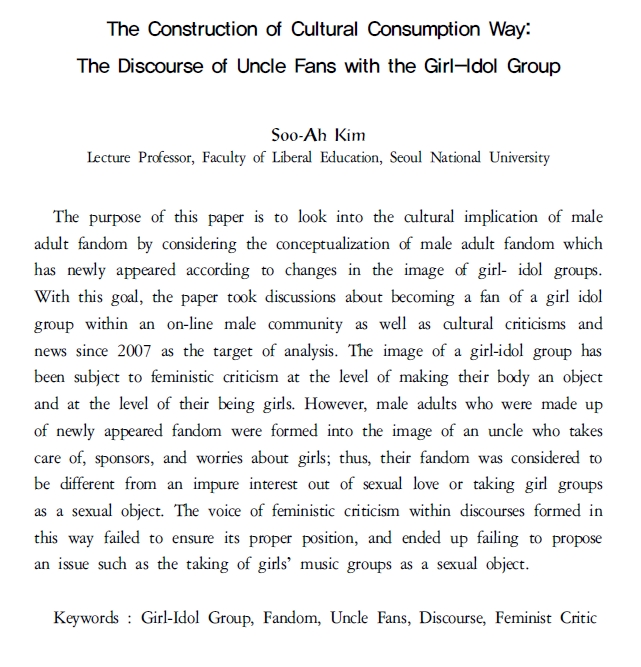 And if they were reluctant to discuss the music videos, then naturally there was a similar reluctance to discuss the same in ads featuring teenage members of girl groups:
And if they were reluctant to discuss the music videos, then naturally there was a similar reluctance to discuss the same in ads featuring teenage members of girl groups:
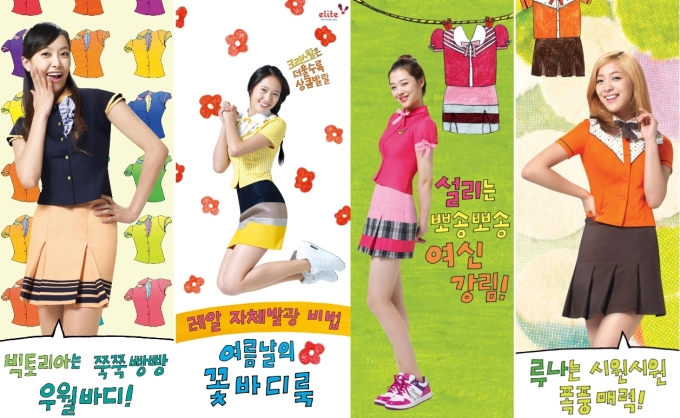 (Source)
(Source)
As discussed elsewhere, Korean entertainment companies have strong incentives to sexualize both girl and boy’s groups clothing and choreography in order to help them stand out from other groups, and they also have financial incentives for groups to endorse as many products as possible; in a symbiotic relationship, this naturally combines well and perpetuates the Korean advertising industry’s heavy reliance on the use of celebrities. Consequently, not only does the number of ads featuring girl group members likely show a direct relationship to the proliferation of girl groups in recent years, but also they too are increasingly sexualized, and – crucially – naturally have messages that resonate with teenage girls. After all, this is the heart of the Lolita Effect: that especially cosmetic and fashion companies want younger and younger girls to embrace the notion that hypersexual body display and obtaining a narrowly defined physical ideal are at the core of – nay, the only things required for – social and romantic success, and that these can best be achieved through purchasing those companies’ products.
This logic, of course, is nothing new. But, if you can forgive my naivety, I’ll never cease to be amazed at the audacity at some of the ensuing advertisements. On the far left in the school uniform advertisement above for example (discussed in more detail here), Victoria of the group f(x) is praised for her height, thinness, and, well, large breasts and buttocks (all of which is contained in “쭉쭉빵빵”, the old term for “S-line“). Meanwhile, in another one further up the page (this one) fellow group member Sulli (17) says “Romance will start in a semester without pimples”, and in the video below that she proclaims the efficacy of using skincare products to get your man over other methods such as: getting cosmetic surgery to get double eyelids; working on getting shiny, billowing hair; or even getting an S-line.
Granted, correlation doesn’t mean causation, and one additional factor may be the considerable relaxing of many rules about school uniforms over the past decade (skirt lengths are 10-15cm shorter than in 2000 for example, which—sigh—the Korean Federation of Teachers Association says “can make students more vulnerable to crimes”). But…naah. Provided the report is accurate, then of course middle school girls are suddenly wearing make-up because all these girl groups are suddenly endorsing them. It would simply be a bizarre coincidence otherwise.
 (Source: unknown)
(Source: unknown)
What to do about it? Beyond educating children on the hows and whys of advertising and/or forcibly taking their cosmetics off them, I’m open to suggestions. One think I certainly don’t think will work though, is complaining to the companies themselves, which have a strong vested interest in making their products appeal to young girls as explained. Indeed, this was recently indirectly demonstrated by Iconix Entertainment, the producer of the very popular Korean cartoon Pororo the Little Penguin (뽀롱뽀롱 뽀로로) above, which, despite the pleas of Korean parents, besieged by their children demanding breads and cakes like those in the show, politely declined to depict the characters eating healthier meals (I believe the characters are also on all manner of junk foods). And God knows how they would have reacted to my own suggestion that pink Loopy above, the only female character in the first season, do something other than constantly make said breads and cakes for the boys.
For more on the trails and tribulations of being a feminist parent, then I recommend following Baby Gender Diary on Twitter here, in their own words “A Mother and Father. Tweeting about our 3 year old girl and 6 month old boy and how people treat them differently”, and/or purchasing Cinderalla Ate My Daughter by Peggy Orenstein, next in my own wishlist. Or, for more posts in the “Reading The Lolita Effect in Korea” series, please see below.
The “Reading the Lolita Effect in South Korea” series:
- Reading the Lolita Effect in South Korea, Part 1: The role of K-pop and the Korean media in sexual socialization and the formation of body image
- Reading the Lolita Effect in South Korea, Part 2: Six Year-Old Does KARA’s “Butt Dance” (엉덩이 춤) on “Shabekuri 007″
- Reading The Lolita Effect in South Korea, Part 3: A Wave of Middle School Girls Wearing Make-up…Is it all Girl Groups’ Fault?
- Syndrome (신드롬) by ChoColat (쇼콜라): Lyrics, Translation, and Explanation / Reading The Lolita Effect in South Korea, Part 4


I teach at a girls middle school and only a handful of students wear makeup, though many dye and perm their hair. I also wore makeup in middle school but I can’t remember if it was what most other kids were doing or not. And I’m pretty sure I didn’t get the idea from girl bands.
LikeLike
Thanks, and I’ve updated the post a little to take into account other factors. But still, you weren’t a Korean middle school student(!), and like I say the timing is just too coincidental to not be related to girl bands, although certainly things like a possible relaxing of school rules over uniforms (albeit not cosmetics per se?), mentioned in the updated version, certainly may have aided the wave. And I’ll grant that girls would probably have wanted to wear makeup for decades too, only now not only do they have the money to buy them but so many companies are selling them to them, and using idols not that much older than them too.
LikeLike
Just because we pay a lot of attention to girl groups and find them a juicy scapegoat (sexualizing children! showing skin! short skirts! scandalous!) doesn’t mean teenage girls do. They pay about 100x more attention to the boy bands. And mm… why wouldn’t they?
A heterosexual teenage girl would rather spend hours gazing into the eyes of:
a) Justin Bieber
b) Victoria Song
Sure, girl group members are on TV a lot and commonly appear in print ads (though… more than actresses?) but if girls aren’t paying attention to them, that ubiquity is pretty useless anyways. I’ve seen Nickhun and Rain and Shinee all over but I have zero desire to wear their shades of lipliner or BB cream. Odd?
You mentioned 얼짱 syndrome then quoted an old Korean man academic (the best source of insight into a young girl’s mind?) who seemed to think girl groups were to blame (?). Yes, 얼짱 culture (and, thus, 판 culture and the stunning speed with which the country reached high-speed internet saturation) is definitely in play, but 얼짱 culture IS NOT girl group culture. Girl group members are not the most famous, most-liked, most-discussed, most-scrutinized 얼짱s on the internet, nor are they the ones giving make-up/hair tutorials, nor have they become famous STRICTLY for their faces, so they just don’t inspire ‘facial’ competitive spirit/self-scrutiny in the same way.
Girl group members are famous for being cute, yes, but also for dancing, singing, and as you mentioned, having nice bodies. If there were upticks in all of these activities, then, yes, I’d be more inclined to play up the influence of girl groups on a teenaged girl’s psyche, but since the infamously alarmist Chosun Ilbo hasn’t yet reported on a terrifying surge in dance/vocal hagwons or on teenage girls lining up at the gym to do squats and butt clenches, I’d refine my hypothesis.
LikeLiked by 1 person
James, don’t tell you daughters they are smart! Modern educational and motivational studies are unanimous in saying that telling your child she is smart is counter-productive.
Now, I can imagine the Turnbull family at home:
“Dad, am I pretty?”
“Yes, dear.”
“Dad, am I strong?”
“Yes, dear.”
“Dad, am I smart?”
“No comment.”
LikeLike
Oh, I don’t know. My wife is already enough of a Tiger Mom that they’ll need all the positive reinforcement they can get!
LikeLike
My understanding about motivation is that purely evaluative terms (good as well as bad) are counterproductive in the long term, such that the best thing is merely the recognition of details. This works pretty well when your kid’s drawing a picture, writing a poem or playing soccer, but how to apply it to appearance???
LikeLike
I’m not sure I agree with you, James, that this articl is well written. In fact, I think it’s lacking somewhat in the journlistic side of it. I’m sure you meant, however, that it was writen with good intentions. I think yes and no. Bringing people’s attention to young schoolgirls wearing makeup and this being a bad thing is obviously a worthy aim, but no matter how many times I read the article, it’s main argument for why they shouldn’t be using makeup is because it will make their skin bad. So when I see things like “어린이들은 피부 약해 트러블 생길 위험 크다 (by the way, the Konglish word 트러블 means acne or spots)” or this “어린 나이에 화장하면 피부에 안 좋다” and this “초등학생 때부터 화장을 시작해 피부가 어른처럼 엉망인 애들이 갈수록 많아진다” but worst of all this “어린이들은 어른보다 피부가 약해 립스틱이나 매니큐어 등 색조 화장품을 사용하면 피부 트러블이 생길 수 있어 조심해야 한다” coming from an official of the FDA, I think the author is missing all of the points you so rightly made about adults sexualising their childhoods nd adolescence. Her main argument seems to be if young girls are using makeup at such a young age, when they get older their appearance will suffer for it… 헐~~
Then there’s this, “성적이 상위권이거나 모범적인 아이들이 화장하는 경우도 늘고 있다.” I don’t even know what to make of this. Why should it be more surprisinig that even students with better grades are doing it? Why is it presened as if this is somehow more troubling?
“Kim says that she scolded her daughter to make her stop using it, but her daughter resisted and replied that “If I don’t wear makeup, I’ll be embarrassed and won’t be able to go to school”. She added that “although this sort of thing is natural for a girl entering puberty, I worry that her ability to concentrate on her studies is decreasing.” Ah, perhaps we can see more of the cause of the problm here. Why can’t a parent stop her daughter from at least buying and onwning her own makeup at this age? That’s a genuine question, because I’m not a parent. Desipte not being a parent, however, I do think it’s fairly weak to simply give in when the daughter comes out with “If I don’t wear makeup, I’ll be embarrassed and won’t be able to go to school.” Then again, what are the chances that Ms Kim would ever contemplate going to work without makeup herself. And herein lie the two biggest factors in why this can’t be controlled. The first is that Korea is a society where women are essentialy obliged to wear makeup, to “manage” their appearance so as to be as physically appealing as possible. Children copy adults. Therefore… The second is related – you have the societal pressure to conform, the huge emphasis on appearance in all things, the focus everywhere on female beauty being an important trait for success. All this to the extent that a girl would come out with the phrase “If I don’t wear makeup, I’ll be embarrassed and won’t be able to go to school.”
One final criticism of the journalistic qulity of he article itself, though. “One homeroom teacher” – just the one, let’s not forget. And then there’s “Teachers say” and “Parents of students are worried.” – Is one example of each enough to justify such wording?
On the other hand, I think the article concludess with it’s strongest line – always a plus. “it is a natural trait of female students entering adolescence to want to look pretty, but this mass of girls trying to find satisfaction and fulfillment through make up is a serious problem.” Can’t argue with that.
Also, quick question: what is BB cream???
Unortunately I can’t comment too much on the impact of girl groups in all this, seeing as I’m neither a female Korean teenager, nor do I listen from choice to any of said groups. I do think, however, that their image can be a bit to overtly sexual considering the ages of some of the members, and espcially when they know what sort of young people are going to be idolising them. More than this, though, I get really disapointed by the lack of people who seem to choose not to mention that images like the ones you’ve used here arre presented with sexual undertones, ones that register subconsciously at least with adults but children may not fully understand. That lack of understanding will not stop them wanting to copy the look, the demeanor, the poses, as evidenced by fact that the images used here are in reality adverts aimed at young girls, yet featuring clothes, poses etc that a clearly desirable sexualy to adult men (not saying that men will be attracted to these young girls or any others like this as a result.
LikeLike
Thanks for your comment, and yes indeed the article isn’t well written – technically, I said it’s “probably one of the better articles I’ve read in the notoriously tabloid Korean media”, which doesn’t mean by normal standards it isn’t still quite bad! Admittedly though, I guess I’m so used to appalling journalism from Korean newspapers that I sing the praises of anything only moderately bad (or superficial, in this case)…
I agree with all your critiques of it then, and of Miss Kim’s parenting skills. But to play Devil’s advocate for the reporter’s use of the plurals – “Teachers say” and “Parents of students are worried” – though, even if a journalist had indeed interviewed many of each it would still be difficult (with world limits and so on) to write anything more to that effect than “Parents say” and then “Miss Kim, for example”, just like the reporter Kim Yeon-ju does. Of course, not for a moment am I saying that journalists don’t regularly interview a grand total of only one parent or even none and then go ahead write “Parents say” regardless, and so I guess what to ultimately make of any article boils down to our own sense of critical thinking, faith in the newspaper and/or reporter, and how well both respond to queries about their sources (see here for Michael Hurt’s recent negative experience with that).
(Update: Ahem…was very sleepy when I wrote that sorry. I take it back: it would be easy to acknowledge one only used 1 or 2 sources)
Good point about Mrs. Kim the mother despairing at her daughter feeling that she couldn’t go to school without makeup, whereas there’d be very slim chances that she’d ever go work herself without it. And I really should have mentioned that context of the huge emphasis on appearance for adults here too, especially women.
LikeLike
Being male and having worn BB cream before (for a photoshoot) I can say that it is excellent. It’s kinda like a concealer/foundation crossed with a lotion. Almost every Korean woman I’ve met (and a few men) wear it daily.
LikeLike
Thanks. I’ll have to try it!
LikeLike
After I read this yesterday I found this in an email sent to me by Sephora (cosmetics store, for those who may not know).

(Hope this link works) I found it interesting that Sephora knew what was “hot” in Asia.
Apparently BB Cream is in the U.S. too!!
http://www.sephora.com/browse/product.jhtml?id=P285402&categoryId=B70
LikeLike
Thanks for passing that on. And now that I know what it is, I’ll probably see mention of it every time I walk past a cosmetics store!
LikeLike
Thanks for this interesting article. For one of my final projects for a History class (History of Korea in fact) my group and I researched the Korean wave. Of course one of the topics that we talked about were the Korean girl groups and the increasing popularity they are seeing. One of our concerns involved the influence of girl groups, and I wish that I would have seen this article much sooner, it would have gone great with our presentation. Would you happen to know if there are any statistics on this phenomena?
LikeLike
Thanks very much for the compliment(!), but could you please be more specific with what kind of statistics you’re after exactly? I need to know before I can help sorry!^^
LikeLike
You know, I am often shocked at the things that come out in advertising and TV broadcasts in Korea. I have been in Korea for 3.5 years, and in that short time things have changed so drastically that I sometimes cannot believe my eyes. 15 year old girls wearing skirts up their ass, teenagers dancing on the stage in a way that you’d normally see in a strip club, increasingly younger and younger girls in sexually suggestive advertising – and have you ever noticed how when a new girl group debuts (i.e Dal Sherbert), the *youngest* member tends to have the most skin visible. It’s a trend I have noticest of late, and it’s really jarring me.
LikeLike
I agree about the youngest member of a new group tending to have the most skin available, and first noticed it with (then) 15 year-old So-hee of the Wondergirls back in 2007. If you’re interested, Matt at Gusts of Popular Feeling has a lot more about that here.
There’s so many girl groups and such young members of them nowadays though, that I haven’t really kept track, although I’m pretty certain that it’d be true for Hyuna of 4Minute at least (pics like the opening one
herein the last post being exhibit A for that).LikeLike
Small point: agreed with pretty much all ofthe above, but I thought that with the debut of Miss-A it was a deliberate strategy on the part of JYP to keep Suzy, the youngest, the most covered in a video that was otherwise pushing the envelope in the increasingly erotic presentatiation of girl groups…..I haven’t checked the ages on Dal Shabet but will take your word for it (Supa Dupa Diva has the shortest shorts I think I’ve ever seen…). Btw, I also think that the 3.5 year time line is pretty much exactly right too. I feel fairly certain that this can all be traced to the phenomenal success of “Tell Me” driving things further annd further in this direction, and that would have been summer 2007 or so if my memory is right……
LikeLike
Thanks for adding that. As I typed my comment I remembered that we’d discussed this issue at some point, and that you disagreed about…something, but I couldn’t remember what exactly. You’ve just saved me an email to you!
LikeLike
In addition to forgetting what dogdyedblack and I said about this, I also forgot to mention in my reply to PJB that in fact 18 year-old Hyuna isn’t the youngest member of 4Minute, but rather 16 year-old Kwon So-hyun (권소현) is. Like I said, I haven’t really been paying attention to this sort of thing for a while, but I’d wager that it’s really only Hyuna that’s been singled out for showing skin etc. in that group.
LikeLike
I’m an adult, I earn my own money and try to not hurt my wallet by giving into every temptation while shopping so I can only imagine what young girls left with their allowance and a cell phone would do given that many of them take the subway to go to school and after school activities everyday. Actually I’ve witnessed it so many times both in the subway and at makeup stores. I live and study in a woman’s university neighborhood so there is a profusion of makeup stores and it’s not unusual for me to wait in line to buy cosmetics for myself along with schoolgirls in uniforms depending on the time of the day, as a matter of fact it happened that one time a particularly bold schoolgirl -maybe pushed by her other two friends- tried to speak English with me half giggling half giving me advice about how number 21 bb cream wasn’t the right color for me…
As for girl groups one important thing to me is that they almost all follow the same pattern of advertising school uniforms/ electronic dictionaries and such and at the same time advertise makeup products, with ad campaigns happening at the same time it gives off that impression that makeup falls in the same category of school necessities.
Also the art of taking selcas (self taken pictures with your cellphone camera), I mean really it’s an art, has a lot to do with young girls not standing a single skin imperfection: many girl groups members have a personal page (twitter, me2day, cyworld…) where they upload pictures of themselves with a “bare face” meaning they only wear the usual 5 or 6 skincare products, suncreen, bb cream and eyeliner.
Funny enough in some family friendly tv programs like Heroes or Invincible Youth where female singers have to go on missions if they fail one “punishment” would be to make them wash only half of their face and look straight into the camera or for Invincible Youth to film the singers before they go to bed as they take their makeup off and make fun of them if they look shockingly different with their bare face. I’ll admit that even with no makeup most of them have already near to perfect skin so they are basically doing this only to be praised by the audience at home: some other team member might tell the barefaced singer “Oh you look like a ghost, where are your eyebrows?” when she obviously looks really good without makeup increasing self criticism of young girls watching these shows.
Just to finish I wouldn’t say it’s girl groups that are to blame, or not just them, as except for Goo Hara or Sandara Park (A’Pieu and Etude House respectively I think) I can’t really remember seeing any advertising panel on the street in front a makeup store featuring a female singer, most of them are actually male idols like JYJ, the main singer from CNBlue, Lee Hongki, Won Bin, So JiSub, Lee SeungGi, Kim Hyun Joong… So I’d say the marketing and advertising of makeup products rely on idols male and female as a whole at least for those relatively cheap products that young students can buy without spending all their allowance. Higher end or department stores exclusive brands tend to hire actresses or simply professional models but obviously they don’t target the same customers.
LikeLike
Big deal – teenagers are acting like teenagers. Take it away if they’re playing with it in class and make them go wash it off if you really don’t like it.
BTW, 1st-year MS students would be 12 or 13 in western years and 2nd-years 13 or 14.
LikeLike
Weeellll…
I am not Korean but I began wearing make-up when I was 10 years old, I can’t say I remember exactly why. My etsi (mom) did everything to deter me but nothing worked. So..I don’t know? What can you say to these girls? I mean, they’re teachers and mothers might wear make-up, their idols definitely do, and they DO look prettier with it on (in their opinion, and many other peoples). Aren’t they just being realistically ahead of the game by wearing make-up early?
LikeLike